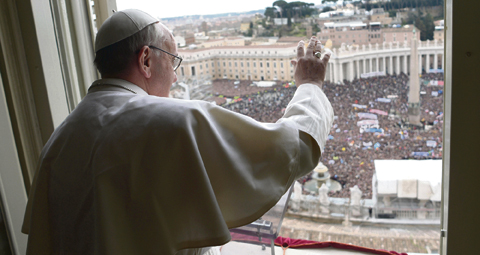February 2 | ![]() 0 COMMENTS
0 COMMENTS ![]() print
print

Evangelisation and encounter matter
THE BOW IN THE HEAVENS explains why our words and the Word of God are crucial to our Faith — By FR JOHN BOLLAN
I sometimes wonder if, a few moments before leading the Angelus on a Sunday, the Pope has a quick peek out of the window of the apostolic apartment (right) to see what the crowd is like that day. I occasionally do the same, subtly parting the vertical blinds in the office overlooking the car park to see how busy it is.
Although it wasn’t by design, it so happens that the precincts of St Joseph’s sort of mirror those of the Vatican, but instead of the outreach of Bernini’s graceful colonnades, the Piazza San Giuseppe—as I like to call it—is framed by the hall and the church itself. Again, like St Peter’s, we face east; but it’s not Castel St Angelo and the Tiber which stretches away in the distance, rather the Clyde and the Erskine Bridge.
It is important, I think, that the ‘arms’ of the Church should be open in a welcoming embrace. While the Vatican symbolically draws the world to itself, our reach is more modest. But to this place—in the past week alone— have come people of all ages, some in need of consolation after a bereavement, some in search of counsel, others in need of food, and one who just wanted their passport application countersigned. There were people dealing with the aftermath of suicide, mental health issues, unemployment and family break-ups. And that’s just one week—and not a particularly exceptional one, I might add.
One of the challenges presented to the Church in our diocese by the recent synod has been the task of becoming a Church of Mission. That means, I think, not just being welcoming, but being in ‘search mode.’
The bishop prefaced his recent pastoral letter with some words of Pope Francis: “The Church exists to evangelise and we have to renew those structures that get in the way of our going out to spread the Good News. We want everyone to feel included and that means our parishes becoming centres of mission, getting back into the homes of everyone in the area, inviting all without exclusion to participate in our joyful community.”
That is where many of us will struggle, I think. We lost—both through a reduction in manpower, but also because of a change in culture and society—the practice of ‘priests knocking doors.’ I’m not sure I can see myself knocking random doors up a close in some parts of my parish where even the Rottweilers go around in pairs. Or, if I did go, it would have to be in a posse.
I’m full of admiration for those folk, often as part of a lay apostolate like the Legion of Mary, who carry out large-scale visitations. The fact that it still happens shows that it can still be done and we need not read Pope Francis’ words in solely clerical terms: ‘getting the Church back into the homes of everyone in the area’ means more than getting the priest into those homes—although that is, no doubt, a desirable outcome.
One bit of that aspiration, which I have always embraced is that, whenever possible, I try to go to the people as much as I can. Not only is the call room here tiny, but I always find it very instructive to see families in their own spaces, surrounded by their own photos and memorabilia.
People often don’t know how to talk to a priest—and sometimes vice versa—but if you can ask about a family photo, strike up a friendship with the dog or cat, or pass the time of day commenting on the daytime TV antics of Philip Schofield and Holly Willoughby, then you often have an entrée to the serious stuff.
So, while a deceased parishioner may have been entirely unknown to me—perhaps having lived two doors down from someone I would be bringing Holy Communion to—being in their home with their family does create a kind of familiarity with them and their loved ones. In a short space of time they cease to be strangers. That may not sound like much, but in reality, it’s quite a big deal.
Apart from a couple of funerals, the main focus has been Catholic Education Week. Last weekend we had staff and pupils from our local schools playing a prominent role in the Liturgy. Each morning in the high school we had
special assemblies for each year group to celebrate not just the contribution of our present schools to the common good, but the past 100 years of state Catholic schooling.
At the Education Week cluster Mass for our area, I reminded the congregation that the Education (Scotland) Act 1918 came into law 10 days after the end of the First World War. Many young men not much older than our Sixth Years didn’t return from that conflict—indeed some their age (and younger) lied about their birth dates so they could sign up. Those who did return came back changed, many of them scarred and broken, tormented by flashbacks and recurrent nightmares.
Jump back to 2018 and it’s tempting to suggest that the biggest nightmare our young men (and women) face is a bad hair day. It’s tempting, but it’s not true. There is, in fact, a new war in which our young people are engaged: its battle lines are drawn through their relationships, their identities, their sense of self and self-worth.
These are often undermined, as surely as by those First World War tunnellers, by the ‘influencers’ of the younger generation and those big corporate interests who sponsor them.
Social media can be a fairly anti-social friend these days, not least in the way it has redefined friendship itself and allowed strangers and strange ideas to get a foothold in their lives.
As many parents will have discovered, the pressure which can be exerted on their children by being picked on or left out of a group is as real as any of the old school bullying strategies.
All this can lead to a sense in which our young people are caught up in a war that none of us can really see, unless it spills over into their relationships with us. It doesn’t manifest itself in shell-shock but in a kind of stealth-trauma, which can be every bit as debilitating. They can become resentful at not having access to the things that they are told they should have plenty of. They can be filled with self-loathing at not having the kind of bodies which they are told are attractive and, worse still, they can be manipulated into showing those bodies for the amusement or gratification of those who do not love them. And all of this on a mobile phone.
The Gospel on the Monday of Education week was the healing of the Gerasene demoniac. Here a man, possessed by a legion of spirits and their cacophony, howls and cuts himself. Jesus intervenes to liberate this poor man, just as, equipped with ‘a teaching that was new,’ he had also healed a man in the previous Sunday’s Gospel.
There is a deep connection between the presence of Jesus as the teacher and the healer of souls as well as bodies. It is that same presence which should make every Catholic school a place of encounter as well as learning, encounter with His Word, his love, his teaching which is always ‘new’ and liberating. Jesus is, and this is no spelling error on my part, the Principal of each and every one of our schools because he truly is the ‘headteacher.’
His Word should be heard clearly in our classrooms and beyond; His teaching, which is essentially loving and redeeming, should silence those angry, wounding, confusing voices which beset our young people—and, to an extent, all of us.
It is said that the technology with which our young people are growing up is actually rewiring their brains: but, like the first stone picked up by our ancestors, it can either be a tool or a weapon. One of the most pressing tasks for Catholic educators is to ensure that rewired brains are accompanied by hearts and minds refashioned by the Gospel which is forever new.










